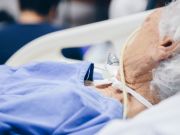- Are You Making This Expensive Thermostat Error This Winter?
- Recognizing the Signs of Hypothyroidism
- 10 Strategies to Overcome Insomnia
- Could Artificial Sweeteners Be Aging the Brain Faster?
- Techniques for Soothing Your Nervous System
- Does the Water in Your House Smell Funny? Here’s Why
- Can a Daily Dose of Apple Cider Vinegar Actually Aid Weight Loss?
- 6 Health Beverages That Can Actually Spike Your Blood Sugar
- Treatment Options for Social Anxiety Disorder
- Understanding the Connection Between Anxiety and Depression
For Stroke Survivors, Timely Rehab Has Been Jeopardized During Pandemic

Timely rehabilitation is crucial for stroke survivors, but some may not be receiving it due to the coronavirus pandemic, experts say.
Rehabilitation can help the 795,000 stroke survivors in the United States achieve the best possible recovery, according to the American Stroke Association (ASA).
That’s why it’s critical to begin rehabilitation within three months of a stroke, when the brain most quickly adapts to stroke damage and survivors are best able learn new ways to do things.
“After a stroke, a person may need therapy to learn to walk or talk again, relearn skills needed to be independent, recover communications and cognition skills, and address other consequences of stroke,” said Dr. Joel Stein, vice chair of the ASA’s Guidelines for Adult Stroke Rehabilitation and Recovery.
“Unfortunately, during the COVID-19 pandemic, some recent stroke patients may be going without rehab during this important ‘golden’ time and other survivors may also be forgoing helpful therapy,” he said in an association news release.
The pandemic has forced rehabilitation professionals to get creative to deliver services. Steps include video calls, teaming up with organizations providing in-home support, and the use of personal protective equipment for staff and patients at in-person visits.
“Rehabilitation is an important step in a stroke survivor’s recovery,” Stein said. “Knowing how important it is and how to best support someone who has recently had a stroke during the pandemic may be one of the most impactful things you can do as a caregiver.”
The association recommends that stroke survivors ask their doctor for an assessment of the physical and mental challenges they face and a plan to address each one. Patients should then work with their doctor on steps to manage risk factors to prevent another stroke. Those steps could include more physical activity, not smoking and managing blood pressure.
Stroke survivors should start rehabilitation as soon as they get the go-ahead from their medical team, the ASA said.
More information
The U.S. National Institute of Neurological Disorders and Stroke has more on stroke rehabilitation.
Source: HealthDay
Copyright © 2026 HealthDay. All rights reserved.










